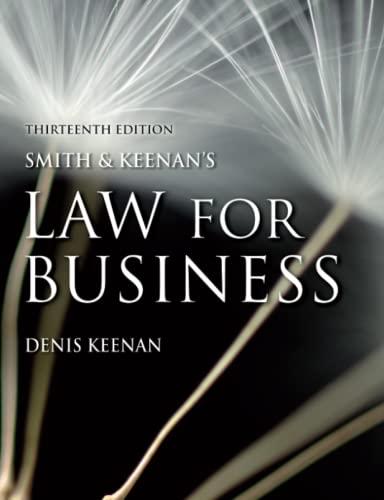Question
State governments have jurisdiction over __________. only the areas of law explicitly given to them by the U.S. Constitution individual rights, but not public law
State governments have jurisdiction over __________.
- only the areas of law explicitly given to them by the U.S. Constitution
- individual rights, but not public law
- any areas of law not specifically reserved to the federal government
- the exact same areas of law as the federal government
Alongside the states, the federal government increasingly governs which area of law?
- Domestic matters
- Property law
- Contract law
- Environmental law
Knowledge of the __________ minimizes a business's liability exposure when making employment decisions.
- Securities and Exchange Commission
- Sarbanes-Oxley Act
- Federal Trade Commission
- Civil Rights Act
Compared to traditional litigation, arbitration and mediation are both __________.
- not favored or supported by courts
- more formal and complex
- rarely used as forms of dispute resolution
- quicker and more cost-effective
Select the true statement about statutory law.
- Statutes at the state level are binding on all states.
- Statutes are formed by democratically elected legislative bodies, subject to a system of checks and balances.
- Congress may enact statutory law in any area it so chooses.
- At the federal level, the President has no power whatsoever over the creation of statutory law.
A landlord sues a tenant for destruction of property. During the trial, the judge issues instructions to the jury to clarify what facts it must determine to issue a verdict.
When in the trial process does this occur?
- Following jury selection
- After the closing arguments
- Before the opening statements
- During cross-examination
If a breach of contract case is filed in federal court, the court __________.
- has no subject matter jurisdiction and cannot hear the case
- has no subject matter jurisdiction, but can hear the case at its own discretion
- has subject matter jurisdiction if the claim is forlessthan $75,000 and no plaintiff lives in the same state as any defendant
- has subject matter jurisdiction if the claim is formorethan $75,000 and no plaintiff lives in the same state as any defendant
Step by Step Solution
There are 3 Steps involved in it
Step: 1

Get Instant Access to Expert-Tailored Solutions
See step-by-step solutions with expert insights and AI powered tools for academic success
Step: 2

Step: 3

Ace Your Homework with AI
Get the answers you need in no time with our AI-driven, step-by-step assistance
Get Started


